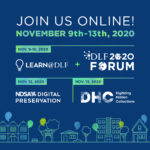 Though DLF is best known for our signature event, the annual DLF Forum, our working groups collaborate year round. Long before COVID-19 introduced the concept of “Zoom fatigue” into our lives, DLF’s working groups organized across institutional and geographical boundaries, building community while apart, to get work done. Made possible through the support of our institutional members, working groups are the efforts of a committed community of practitioners, using DLF as a framework for action, engaged in problem-solving in a variety of digital library subfields from project management and assessment to labor and accessibility.
Though DLF is best known for our signature event, the annual DLF Forum, our working groups collaborate year round. Long before COVID-19 introduced the concept of “Zoom fatigue” into our lives, DLF’s working groups organized across institutional and geographical boundaries, building community while apart, to get work done. Made possible through the support of our institutional members, working groups are the efforts of a committed community of practitioners, using DLF as a framework for action, engaged in problem-solving in a variety of digital library subfields from project management and assessment to labor and accessibility.
Once we decided that the 2020 DLF Forum and affiliated events would be held in a virtual format, it meant that our working groups wouldn’t have the opportunity to meet in person for their typical working meals that take place throughout the Forum; however, this year’s virtual format means that we’ll have more new DLF Forum attendees than ever before. Because DLF’s working groups are open to ALL, regardless of whether you’re affiliated with a DLF member institution or not, we asked leaders of the DLF working groups to introduce their groups and the work they do to the new and returning members of the #DLFvillage in a series of blogs and videos.
We’ll share these working group updates in the days leading to this year’s DLF Forum. All of our 2020 events are free of charge. Register by November 1.
Join the Born-Digital Access Working Group during their Forum working session on November 17.
Who are we?
The DLF Born-Digital Access Working Group, or what is affectionately known as BDAWG, is currently led by co-coordinators Karla Irwin and Jessika Drmacich.
BDAWG is the only born-digital group focused entirely on access. BDAWG is very easy to join and the group is open to everyone! Our Google Group is our main mode of communication, so please sign up there if you would like to receive updates and more information. BDAWG meets bimonthly and there are many different opportunities for participation based on area of interest and availability. If you are curious about what members have published so far you can also check out DLF’s OSF site for our BDAWG.
At around 200 members, BDAWG garners participation from a wide gamut of archivists, librarians, and cultural heritage workers coming from higher education institutions, museums, government archives, and even some students.
What have we been working on?
In August of 2020, BDAWG held our first ever Virtual Colloquium. This was an opportunity for BDAWG members to share some work related to born-digital access at their respective institutions. We had a fantastic turnout and there are hopes to hold this event again next year.
Also this year, BDAWG formed five sub-working groups focused around researching different born-digital access topics. These subgroups are typically formed once a year and are discussed, decided, and voted on by our members.
Updates on our sub-working groups!
The Access Values subgroup completed a values statement for BDAWG on the topic of how to approach work around born-digital access. You can read the Access Values here. Special thanks to Jessica Farrell, Brain Dietz, and Alison Clemens for their great work on this!
The Documenting Access Methods subgroup is exploring what elements institutions could include in documentation for providing access. Documenting Access Methods include two *sub-subgroups*: a Framework group and a Pointer group. The Framework group is creating a framework or template for documentation and the Pointer group will categorize and point to existing documentation. The Documenting Access Methods subgroup plans to wrap up their work by the end of this year so be on the lookout for that!
The Donor Relations subgroup has been developing a resource for managing remote donor relations and acquisitions in the form of an annotated bibliography that will be available very soon. Once that is wrapped up, future work by a new subgroup will be looking at remote on-site visits and born-digital acquisitions. There will be some upcoming forums on this topic, so be on the lookout for information (or you can reach out to us)!
The Legal Due Diligence subgroup is creating a resource that helps practitioners understand what steps are needed to provide low-risk access with a close look at Attorney Client Privilege, Culturally Sensitive Materials, Donor Restrictions, FERPA and HIPAA, GDPR, Institutionally Mandated Confidentiality, PII, Privacy, and Terms of Service. They plan on releasing a skeletal set of guidelines with a workflow once they wrap up their research.
The Ideal Access Systems subgroup is working to define what ‘ideal’ access means in order to provide recommendations on how to create and implement ideal access systems in different environments. They are currently working on a literature review of relevant articles and case-studies and finalizing a functional definition of ideal in order to move into their next stage which involves building a project plan for an ideal access system. The subgroup hopes to release their documentation by the beginning of next year.
Get in touch!
Please reach out to Karla and/or Jessika with questions!
Jessika, Williams College, (jgd1@williams.edu)
Karla, University of Nevada, Las Vegas (karla.irwin@unlv.edu)
Keep these links handy:
BDAWG Google Group: https://tinyurl.com/BDAWGGG
DLF OSF website: https://osf.io/hqmy4/
We hope to see you at a future BDAWG meeting!
